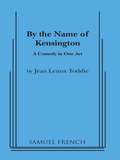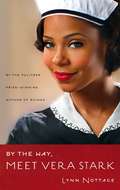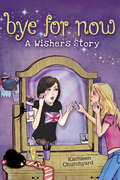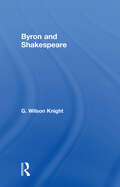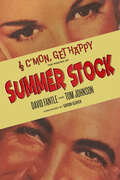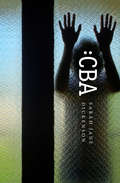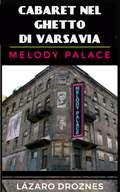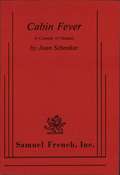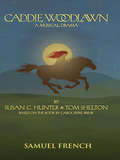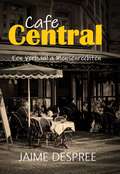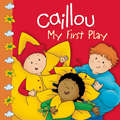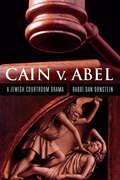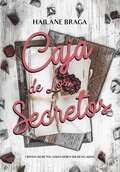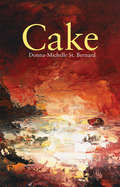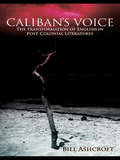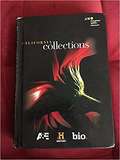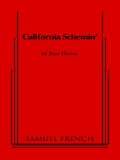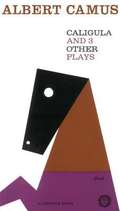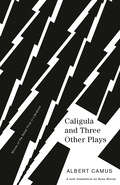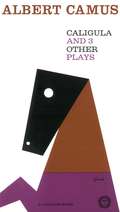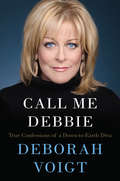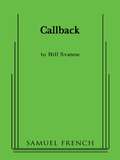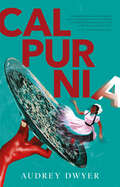- Table View
- List View
By the Name of Kensington
by Jean Lenox ToddieComic drama / 2 m., 2 f. / Simple set. / From the author of A Little Something for the Ducks, White Room of My Remembering and Looking for a Better Berry Bush, among others, comes the story of a well bred cricket from London who is dismayed to find himself playing doppelganger to a woman in Appalachia. In this humorous and touching tale of the relationship between an arrogant black cricket with a Bond Street address and a poorly educated young woman who aspires to better herself, this award winning playwright has created two uniquely lovable characters.
By the Way, Meet Vera Stark
by Lynn Nottage"Nottage is one of our finest playwrights, a smart, empathetic, and daring storyteller who tells a story an audience won't expect." Time Out New York"Lynn Nottage's work explores depths of humanness, the overlapping complexities of race, gender, culture and history and the startling simplicity of desire with a clear tenderness, with humor, with compassion." Paula Vogel, Pulitzer Prize-winning playwrightIn her first new play since the critically acclaimed Ruined, Lynn Nottage examines the legacy of African Americans in Hollywood in a dramatic stylistic departure from her previous work. Fluidly incorporating film and video elements into her writing for the first time, Nottage's comedy tells the story of Vera Stark, an African American maid and budding actress who has a tangled relationship with her boss, a white Hollywood star desperately grasping to hold onto her career. Stirring audiences out of complacency by tackling racial stereotyping in the entertainment industry, Nottage highlights the paradox of black actors in 1930s Hollywood while jumping back and forward in time and location in this uniquely theatrical narrative. By the Way, Meet Vera Stark premiered in New York in 2011 and will receive productions at Los Angeles's Geffen Playhouse in fall 2012 and Chicago's Goodman Theatre and The Lyric Stage Company of Boston in spring 2013.Lynn Nottage's plays include the Pulitzer Prize winning Ruined; Intimate ApparelFabulation, or the Re-Education of Undine; Crumbs from the Table of Joy; Las Meninas; Mud, River, Stone; Por'Knockers; and POOF!
Bye For Now: A Wishers Story
by Kathleen ChurchyardThe candles dripped onto the icing as Robin deliberated. What could she possibly wish? She wanted to wake up the next day and learn all her problems were gone. But since her problems weren’t going to disappear, she didn’t want to be Robin anymore. “I wish I was somebody else,” Robin wished. And in that moment, she meant it. She blew out the candles. After the worst eleventh birthday ever, Robin wakes up the next morning in the body of Fiona, an eleven-year-old girl from London with an amazing life. Fiona is gorgeous, with glamorous parents, and she’s the star of a major theatrical production. Why would Fiona have wished herself out of her own body? Slowly, Robin discovers a whole network of girls like her-girls who have gotten their wish and are living somebody else’s life. But what happens when Robin finally decides she wants to go home? Does anybody in the Wishers network know how to make this happen? In this exciting first novel, Kathleen Churchyard asks: What if you wished for someone else’s life-and it came true?
Byron & Shakespeare - Wils Kni
by Wilson KnightIn this volume, G. Wilson Knight deals with the "superabundance of analogies between Byron and Shakespeare" through analysis and literarty criticism of poetry, sonnets and essays.
C'mon, Get Happy: The Making of Summer Stock
by Tom Johnson David FantleIn their third and final screen teaming, Judy Garland and Gene Kelly starred together in the MGM musical Summer Stock. Despite its riveting production history, charismatic lead actors, and classic musical moments, the movie has not received the same attention as other musicals from MGM’s storied dream factory. In C’mon, Get Happy: The Making of “Summer Stock,” authors David Fantle and Tom Johnson present a comprehensive study of this 1950 motion picture, from start to finish and after its release.The production coincided at a critical point in the careers of Kelly and an emotionally spent Garland. Kelly, who starred in An American in Paris just one year later, was at the peak of his abilities. On the other hand, Summer Stock was Garland’s final film at MGM, and she gamely completed it despite her own personal struggles. Summer Stock includes Kelly’s favorite solo dance routine and Garland’s signature number “Get Happy.”The authors discuss in rich detail the contributions of the cast (which included Gloria DeHaven, Eddie Bracken, Phil Silvers, and Marjorie Main); the director (Charles Walters); the producer (Joe Pasternak); the script writers (George Wells and Sy Gomberg); the songwriters (which included Harry Warren and Mack Gordon); and top MGM executives (Louis B. Mayer and Dore Schary). The volume features extensive interviews, conducted by the authors, with Kelly, Walters, Warren, and others, who shared their recollections of making the movie. Deeply researched, C’mon, Get Happy reveals the studio system at work during Hollywood’s Golden Era.Additionally, the authors have written a special section called “Taking Stock” that buttonholes numerous contemporary dancers, singers, choreographers, musicians, and even Garland impersonators for their take on Summer Stock, its stars, and any enduring legacy they think the film might have. Artists from Mikhail Baryshnikov, Ben Vereen, and Tommy Tune to Garland’s and Kelly’s daughters, Lorna Luft and Kerry Kelly Novick, respectively, offer their unique perspective on the film and its stars.
CBA
by Sarah Jane DickensonTrialled in schools with young people, CBA is a play that asks the really urgent questions of today. It seems so private, just you and the screen. You click 'send'. Then the whole world crashes through. Keisha has a secret, Georgia has a security problem and Tom is afraid to speak out. When should you tell someone's secret? How can jokes go so wrong? Fast paced and thought-provoking , CBA examines growing up in a digital world.
Cabaret nel ghetto di Varsavia: Melody Palace, teatro canzoni ed umorismo per sopravvivere all'inferno
by Lazaro DroznesDescrizione del libro: Cabaret nel ghetto di Varsavia. Melody Palace Teatro, canzoni e umorismo per sopravvivere all'inferno Durante la Seconda guerra mondiale il popolo ebraico sviluppò un'intensa attività culturale nei campi di concentramento, nei campi di sterminio e nei ghetti. Teatro, musica, cabaret, opera sono stati gli assi della resistenza spirituale che ne hanno permesso sopravvivenza. Questo libro è dedicato all'umorismo ed al cabaret ebraico, la forma teatrale che riunisce testi, canto e ballo in un unico spettacolo. L'umorismo ebraico è un modo per elaborare il dolore e la sofferenza. In quell’istante magico in cui appare il lampo di una battuta, la fame scompare, scompaiono le mense popolari, il lavoro forzato, il tifo, i morti sui marciapiedi, il mercato nero, le tessere annonarie, le deportazioni verso Est e le infinite sofferenze vissute per un solo motivo: essere ebrei. Attraverso l'umorismo, il popolo ebraico è stato in grado di preservare la propria dignità e sentire di essere ancora esseri umani nonostante tutti i tentativi nazisti di distruggere in loro tutte le tracce di umanità. L'umorismo ha potuto trasformare il pessimismo in ottimismo. La rassegnazione in speranza. Il presente in futuro. Attraverso l'umorismo il popolo ebraico ha compiuto il suo supremo lavoro di sabotaggio: la sopravvivenza. Ha impedito che le proprie debolezze fossero più forti dei punti di forza. L'umorismo è l'arma segreta del popolo ebraico. I nazisti non hanno capito perché i nazisti non hanno avuto senso dell'umorismo. Perché il tedesco è uguale all'yiddish, ma senza senso dell'umorismo. L'umorismo prima, durante e dopo la Seconda guerra mondiale è stato uno spazio di libertà all'inferno, in cui era possibile essere ottimisti e lasciare il pessimismo per tempi migliori. Le persone che non ridono sono morte prima di morire. Il popolo ebraico ha potuto rider
Cabin Fever (Schenkar)
by Joan SchenkarBlack comedy / 2m, 1f / Unit Set / This comedy of menace features three malevolent New England oldsters on a country porch reciting horrifying and hysterically funny stories about local customs. "Cabin Fever" has been produced around the globe.
Caddie Woodlawn
by Carol Ryrie Brink Tom Shelton Susan C. HunterMusical / 8m, 7f, plus 18 children / Carol Ryrie Brink's Newberry Award-winning novel Caddie Woodlawn is brought to exuberant life as a musical. Caddie (the iconic, high-spirited Wisconsin pioneer girl beloved by generations of readers) leads her willing siblings in a series of thrilling adventures, not always with the approval of her traditional Bostonian mother. Her father, however, encourages her antics, that she might thrive amidst the new, tougher ways of the West. In a dramatic climax, Caddie single-handedly diffuses a potentially deadly clash between the terrified settlers and the local Dakota tribe through a daring and dangerous act. But her action only deepens her conflict with her mother. Ultimately, Caddie learns invaluable lessons about reconciling the head-strong child she's been, and the responsible adult she is soon to be. Through it all, the sacredness of tradition - passed from one generation to the next - is powerfully dramatized. As one wise friend tells Caddie: "Families - they're our link to forever, lass."
Café Central: Een Verhaal A Mensenrechten
by Jaime DespreeZou je met een prostituee trouwen? Zou je een homoseksuele zoon accepteren en naar zijn bruiloft met een andere man gaan? Zou je accepteren dat je dochter abortus pleegt omdat een zwangerschap onverenigbaar is met haar werk? Hoe zou je reageren als je dochter zegt dat ze verliefd is op een gekleurde man en dat ze zwanger is? Dat zijn de morele dilemma's waarin meerdere families in een buurt verwikkeld zijn, waarbij het Café Central de getuige en achtergrond is van deze dilemma's. Het is een pleidooi voor de mensenrechten.
Caillou: My First Play
by Eric Sévigny Marilyn Pleau-MurissiThere's a special event at Caillou's day care. Leo, Clementine and Caillou are getting ready to be in a play. They enjoy dressing up and rehearsing but they appreciate it even more when their parents come to see the show.
Cain v. Abel: A Jewish Courtroom Drama
by Rabbi Dan OrnsteinEnter the packed courtroom and take your seat as a juror on the Cain v. Abel trial. Soon, the prosecution and defense attorneys (angels from Jewish legend) will call Cain, Abel, Sin, Adam, Eve, and God to the witness stand to present their perspectives on the world&’s first murder. Great Jewish commentators throughout the ages will also offer contradictory testimony on Cain&’s emotional, societal, and spiritual influences. As jurors, when we mete out Cain&’s punishment, must we factor in his family history, psychological makeup, and the human impulse to sin? In this highly eclectic and gripping compilation of insights by Jewish commentators on the Cain and Abel story, courtroom scenes are juxtaposed with the author&’s commentary, advancing novel insights and introspection. As each of us grapples with Cain&’s actions, we confront our own darkest traits. If Cain is a symbol for all humanity, what can we do to avoid becoming like him? Furthering this conversation, Rabbi Dan Ornstein includes a discussion and activity guide to promote open dialogue about human brokenness and healing, personal impulses, and societal responsibility.
Caja de los Secretos: Ciertos Secretos Jamás Deben Ser Revelados
by Hailane BragaUn drama familiar donde podemos conocer a Iolanda, una mujer buena y feliz que tiene una vida maravillosa hasta que encuentra una caja con los secretos de su madre. Nada de lo que Iolanda había conocido sobre su vida era cierto ¿cómo va a superar estas verdades?
Cake
by Donna-Michelle St. BernardA man earns. However little, however nefariously, he earns. Oba, a middle-aged businessman, is torn between his pride and dignity. He’s obsessed with making deals in unidentified substances to stay afloat. A powerful client named Araf arrives, interested in Oba’s business, but also his fierce, inherited servant Femi. Oba’s young progeny Mabo is hungry and desperate, but still driven by his skills and sympathetic to the needs of others. In this stark and poetic musing on the nature and poisons of survival, Cake humanizes the dynamic between Niger and Iran and their clandestine trade in uranium, presenting a dark and critical look at oppression, consumerism, and what happens when all of our resources are dried up.
Caliban's Voice: The Transformation of English in Post-Colonial Literatures
by Bill AshcroftIn Shakespeare’s Tempest, Caliban says to Miranda and Prospero: "...you taught me language, and my profit on’t Is, I know how to curse. " With this statement, he gives voice to an issue that lies at the centre of post-colonial studies. Can Caliban own Prospero’s language? Can he use it to do more than curse? Caliban’s Voice examines the ways in which post-colonial literatures have transformed English to redefine what we understand to be ‘English Literature’. It investigates the importance of language learning in the imperial mission, the function of language in ideas of race and place, the link between language and identity, the move from orature to literature and the significance of translation. By demonstrating the dialogue that occurs between writers and readers in literature, Bill Ashcroft argues that cultural identity is not locked up in language, but that language, even a dominant colonial language, can be transformed to convey the realities of many different cultures. Using the figure of Caliban, Ashcroft weaves a consistent and resonant thread through his discussion of the post-colonial experience of life in the English language, and the power of its transformation into new and creative forms.
California Collections
by Houghton Mifflin HarcourtCalifornia Collections: A Grade 9 language arts textbook
California Schemin
by Ron HouseComedy / 3m, 3f / Single Set Roger Gallais, a small time hustler, is in a desperate fight to save his office/home from demolition. He needs $1500 in 24 hours or his estranged wife Lola Montezuma, an illegal alien, and her new boyfriend Nobby Carlyle, a fugitive from British justice, will take procession of the property, turn it into a mini mall and make a million bucks. Roger and his sole employee, Jules, are at the end of their rope, when Wanda Harrington, a naive middle-aged woman from Texas enters. She has just inherited the family oil fortune and is in Los Angeles to find her long lost lover, Henry, who she hasn't seen or heard from in 25 years. Roger reinvents himself and becomes a private detective specializing in missing persons cases and guarantees he will find Henry in one hour. Hilarious results ensue, involving Harvey Martin, "Gay Activist" who is running for mayor of West Hollywood, and wants to turn the city into a living "Camelot" and Shelly Levine, a failed New York standup comic who hates Los Angeles. "If you're up for a an evening of mindless entertainment and guilty pleasure then Ron House's zany farce is for you." - The Los Angeles Weekly "If you see only one play this year make sure it's California Schemin'!" - The Sacramento Bee "California Schemin' is a side-splitting entertainment!" - The Los Angeles Times
Caligula and Three Other Plays
by Albert Camus Stuart Gilbert'One word to tell the reader what he will not find in this book. Although I have the most passionate attachment for the theater, I have the misfortune of liking only one kind of play, whether comic or tragic.
Caligula and Three Other Plays (Vintage International Ser.)
by Albert CamusFour thought-provoking masterworks for the theater by the Nobel Prize–winning author of The Stranger and The Plague, in a restorative new translation by Ryan Bloom that brings together, for the first time in English, Camus's final versions of the plays, along with deleted scenes and alternate lines of dialogue. Though known for his novels that plumb the depths of absurdism, it was the theater stage that Camus called &“one of the only places in the world I'm happy." After forming two troupes in his early twenties in Algeria, the prolific author moved to Paris for work, where between 1944-1949 he would go on to stage the four original plays gathered in this collection.Caligula, his first full-length work for the stage, begins with the infamous Roman emperor in the throes of grief at the death of his sister Drusilla and tugs at the same essential question that haunts so much of Camus&’s work: Faced with the nullifying force of time, which snuffs out even our grandest emotions, how does one go on living? And is there a limit to the hardness of the human heart?Here too are The Misunderstanding, a murderous tangle of the longing for home and the longing for elsewhere; The Just, depicting the 1905 assassination of a Grand Duke in Moscow and testing the ethical limits of one&’s belief in a political cause; and State of Emergency, an allegorical romp where The Plague itself appears as a central character, shedding new light on our current battles with viral disease and authoritarian regimes.These are engaging, often incendiary works, now in fresh English translations that beg to be performed.
Caligula and Three Other Plays (Vintage International)
by Albert Camus'One word to tell the reader what he will not find in this book. Although I have the most passionate attachment for the theater, I have the misfortune of liking only one kind of play, whether comic or tragic.'
Call Me Debbie: True Confessions of a Down-to-Earth Diva
by Deborah VoigtInternationally beloved opera star Deborah Voigt recounts her harrowing and ultimately successful private battles to overcome the addictions and self-destructive tendencies that nearly destroyed her life.Call Me Debbie is one of the most electrifying performances of Deborah Voigt’s life. The brilliantly gifted opera soprano takes us behind the velvet curtains to tell her compelling story—a tale of success, addiction, music, and faith as dramatic as any role she has performed. For the first time, she talks about the events that led to her dangerous gastric bypass surgery in 2004 and its shocking aftermath: her substantial weight loss coupled with the “cross addiction” that led to severe alcoholism, frightening all-night blackouts, and suicide attempts. Ultimately, Voigt emerged from the darkness to achieve complete sobriety, thanks to a twelve-step program and a recommitment to her Christian faith.Colored by hilarious anecdotes and juicy gossip that illuminate what really goes on backstage, Voigt paints diverting portraits of the artists with whom she’s worked, her most memorable moments onstage, and her secrets to great singing. She also offers fascinating insight into the roles she’s played and the characters she loves, including Strauss’s Ariadne and Salome, Puccini’s Minnie, and Wagner’s Sieglinde, Isolde, and Brünnhilde, sharing her intense preparation for playing them.Filled with eight pages of color photos, Call Me Debbie is an inspirational story that offers a unique look into the life of a modern artist and a remarkable woman.
Callback
by Bill SvanoeComedy / 1m, 1f / Simple Set Callback is a two character contemporary comedy, drama about the forty-year mostly professional relationship between an actress and a director. They both go through struggles, heartbreaks, triumphs, and unexpected discoveries along the way. They are bound together on and off by many things, but what keeps them both going is their overwhelming love of the theater.
Calpurnia
by Audrey DwyerJulie, a young Jamaican Canadian screenwriter, is passionately working on an adaptation of one of the most beloved American novels of all time, To Kill a Mockingbird, telling the story from the perspective of the Finch family’s Black maid, Calpurnia. But within the safe confines of her wealthy father’s home, and besides all the encouragement from their Filipina housekeeper Precy, Julie struggles with writer’s block and numerous distractions as her family prepares for an important dinner party. When her brother challenges her, saying she’s appropriating a culture she doesn’t belong to, she goes to dramatic lengths to prove her point, only to find she has much to learn.Calpurnia is a witty and highly charged look at the complicated entanglements of intersectionality and allyship, exposing motives and biases that are clear as a bell one moment, and drowning in ambiguity the next.
Cambridge Introductions to…: The Cambridge Introduction to Theatre and Literature of the Absurd
by Michael Y. BennettMichael Y. Bennett's accessible Introduction explains the complex, multidimensional nature of the works and writers associated with the absurd - a label placed upon a number of writers who revolted against traditional theatre and literature in both similar and widely different ways. Setting the movement in its historical, intellectual and cultural contexts, Bennett provides an in-depth overview of absurdism and its key figures in theatre and literature, from Samuel Beckett and Harold Pinter to Tom Stoppard. Chapters reveal the movement's origins, development and present-day influence upon popular culture around the world, employing the latest research to this often challenging area of study in a balanced and authoritative approach. Essential reading for students of literature and theatre, this book provides the necessary tools to interpret and develop the study of a movement associated with some of the twentieth century's greatest and most influential cultural figures.
